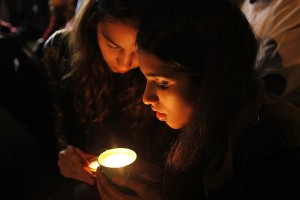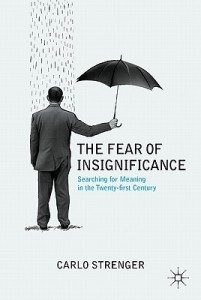Posts by Philippe Matthews
The Fear of Insignificance: Searching for Meaning in the Twenty-First Century

The dreams of becoming doctors and lawyers several years ago have now noticeably shifted to desires of being the next Oprah Winfrey or Mark Zuckerberg. These days, a lot of people are into showing off a popular, noteworthy self-image which results to widespread undermining of self-worth. Over the past 10 years, people have become so concerned of significance, or the lack thereof, that they start to fear every major life decision they make. Many lose confidence in their choices and others grow to become fretful of what might become of their future. Majority tend to become obsessive of how their future will turn out that they fail to enjoy and live in the now.
Dr. Carlo Strenger from the Department of Psychology of TelAvivUniversity conducted an extensive research on this particular behavior after recognizing that it occurred even in his own clinical practice. He presented his findings in his book entitled, The Fear of Insignificance: Searching for Meaning in the Twenty-First Century. In this book, you can find his philosophies as well as illustrations of his 10-year-long investigation on unprecedented depression and anxiety.
Global Angst
Global angst has always existed long before but perhaps not as wide-ranging as today’s times. In Dr. Strenger’s book, he reports several hundred research projects from economic models to experimental existential psychology and sociological studies which all concluded to people having fear of insignificance due to global access. With the advanced technology today and the flourish of social networking, it’s radically easier to find and compare ourselves with the popular people all over the world.
Dr. Strenger explicitly discusses in the book how global infotainment is the factor to blame. He refers to today’s population as comprised of homo globalis or global men who define themselves basing on how connected they are to the current world’s infotainment network. Such has turned rating and ranking of individuals basing on scales of celebrity and wealth into a mania or obsession.
Long ago, becoming a doctor or a lawyer was the reputable profession. Today, however, even excellent achievers think of themselves insignificant the moment they compare their success story to the success stories heavily promulgated by electronic and print media. As a result, many develop unstable self-esteem, leading to an unstable society.
Pop Spiritualism
Another factor tackled in the book is pop-spiritualism which promises instant relief and change to people. According to Dr. Strenger, such resources only create more disappointment instead of solution for the existential unease. As he worded out, cheap-fix guru books that promote instant spirituality do not offer long-term solutions.
What to Do
The best way to overcome the fear of being insignificant to the world is to stop measuring achievements based on the promulgated cultural fantasies of wealth and celebrity. Forget the media craze that is centered on rating and ranking people. This does not lead to genuine fulfillment at all. The real remedy is the process of self acceptance. It’s not easy, but through sustained pursuit for self-knowledge and maturity, it will take place eventually. More than measurable achievement, people must learn to overcome such fear by recognizing their strengths as individuals.
Just as how people are spending time developing their careers, they should also try to develop how they understand themselves and how they relate to the world. Liberal education comes very essential for this. However, it should be kept in mind that this is a lifetime process. So one can live a worthwhile, fulfilling life, he or she must be willing to engage in a lifetime process of evolving and learning.

Poverty & PTSD: Children Born Into a War Zone

It is said that children who are born into poverty and those who are born into a war zone are both prone to developing post-traumatic stress disorder (PTSD). Now, why would anyone want to make such a claim? Well, it is not a claim, but more of an actual fact despite the differing circumstances of their living conditions.
Yes, children who are born into poverty may live differently from those who were born into a war zone. Their living conditions are so much in stark contrast to each other that it is somewhat crazy to conclude that they both can develop PTSD. For example, a child living in poverty can still walk safely to school whereas a child who was brought up in a war zone may fear going outside because of the inherent danger that war poses.
It’s because those who are living in poverty do not always need to be living in really poor neighborhoods. There are varied classifications of poverty, and sometimes it is more of a financial situation rather than a situational one.
A child who is brought up in a war zone experiences the threat of death and destruction each and every day. They are in constant lookout when the next fight is going to erupt, and merely being at home won’t even keep them safe because disaster could easily spill into the comforts of their own dwelling. They are constantly exposed to the sounds of gunfire, screams, and are also exposed to the smell of death each and every day.
As you can see, the picture painted shows that they very much differ, but both are very much prone to develop PTSD. You might think that those in the war zone may be greatly affected because war in itself is quite traumatic. But living in poverty, especially generational poverty, has ways of affecting your way of thinking and being that will lead you on the path towards PTSD as well.
The basics of PTSD
What’s the first thing that comes into your mind when you hear that someone is suffering from PTSD? Do you visualize them having been abused? Do you imagine them having been involved in some terrible accident? Do you think about them as a victim of a violent crime?
More often than not, the situations above are the ideas that would form in your head when you’re informed that a person is suffering from PTSD. However, that is not always the case. Those who have PTSD are not always victims of rape, domestic abuse, car accidents, and other “single blow” traumas. In fact, PTSD can be associated with long-term exposure to “chronic traumas” such as childhood abuse, living in a high crime area, experiencing domestic abuse, and yes, living in extreme poverty.
Trauma is a subjective experience when talking in the context of PTSD. It is an event in which a person feels cognitively, emotionally, or physically overwhelmed. In fact, an event can be traumatizing for one person but have no effect on the other. There are also cases when just hearing about traumatic events that happened to another person is enough to cause PTSD.
Think about it this way: when you are in danger, it is a very natural to feel afraid about what will happen. This kind of fear triggers a lot of split-second changes in your body to prepare it to defend against the danger it is about to face. Or, in other cases, your body changes so that you are prepared to avoid any sort of danger. It is a “fight-or-flight” response and is a very healthy reaction by the body so that you remain protected from harm.
However, in the case of having PTSD, this kind of reaction is changed or damaged. Those who are suffering from PTSD may be the person who is harmed, or the harm was done to someone they love, or the person was a witness to a harmful event that happened to a loved one or even a stranger.
You would most likely hear PTSD associated with war veterans, but rest assured it is a phenomenon that can result from a variety of traumatic incidents as well. Victims of mugging, rape, or torture are prone to experience PTSD. Not only that, those who have experienced being kidnapped or held captive, child abuse, car accidents, train wrecks, plane crashes, and bombings can all develop PTSD. Furthermore, even victims of natural disasters such as floods or earthquakes are prone to develop PTSD.
Living in poverty
What does “living in poverty” really mean? Some would define it as the lack of financial resources to support a standard of living. Examples that would fall into this category include not being able to buy a supply of food for your family, not being able to provide for the purchase of vitamins you and your kids desperately need, or not being able to have enough money to buy a certain standard of housing. Basically, this kind of definition refers to not having enough for the basic standards of living.
Others would define poverty as a social condition. One good example of this would be to look back at the past. For instance, many years ago, a man would be ashamed to walk out in public without having a decent shirt put on. In other words, poverty as a social condition is not having enough money to buy what society expects you to have. For example, if you live in an affluent neighborhood but your family doesn’t own a car and you commute to school, others might perceive you as poor because you don’t own what most of your community owns.
Some would also define poverty as the impact of prolonged unemployment. Let’s just say you graduated during a recession, meaning you couldn’t secure a job that actually related to your profession. What this means is you have to search for other job opportunities so far out from what you majored in just so you could put food on the table, pay rent, and pay bills. Then when the economy seems better, you find it hard to secure a job related to what you studied because you don’t have the needed experience in that particular field.
There are also times when employers just stay stuck looking at the number of months or years you’ve been unemployed rather than your experience as a whole. They will pass you over even if you have all the skills that is needed for the job because you have not been in the work force for quite some time.
Living in a war zone
What are the living conditions of people in a war zone? If you are the type to watch the news on TV, listen to the radio for current events, or even read up about what’s going on in the world on the internet, you already have a vague idea of what the situation is like in war-torn nations.
One of the most common themes that exist is that violence is everywhere. Not a day would probably go by where a death isn’t reported. In other words, those who live in a war zone have a very high chance of being casualties of war. A better term for this would be the innocent victims of a war they didn’t ask for.
Everyday, there is always the chance that you feel loss and death. What’s worse, you even have not recovered from mourning the previous day and suddenly another atrocity happens. In short, living in a war zone is a constant struggle with emotions and pain that would surely leave a dent on any person, young or old.
Those who are living in a war zone are constantly thinking about ways to leave, but just couldn’t find a way to do so. Their everyday thoughts are filled with what it would be like to live in a better world so that future generations would not have to suffer. However, all these positive thinking will be promptly interrupted because there would a gun fired here or a grenade exploding there. In other words, people living in a war zone, are in constant fear for their life.
What’s even tougher is that they have to live through it as if it’s just a normal way of life. They still have to go about what they do, but with an added fear that anything can happen once they step outside. It is a daily reality for them, especially if they live in a not-so-affluent part of a war torn country. Yes, the rich can be affected by having war in their country, but they do have more privileges compared to those who live in poor conditions.
The connection between poverty and PTSD with children born into a war zone
As you may have noticed, there is a definite contrast between children who were born into poverty and those who were born into a war zone. But despite that, their situation is analogous to each other because both of them have not lived a normal life. Yes, a child from a poor family can still walk safely to school but he doesn’t have the things that his other classmates have. A child from a war zone may still go to school but is surrounded by death when he steps outside his door.
All of these traumatic experiences can build up and turn into early warning signs for PTSD. As mentioned earlier, merely being a witness to a traumatic event is enough to trigger PTSD. This being said, children born into war zones also have the tendency to exhibit violence later on in life just like a child in a poor household who is constantly witness to domestic abuse.
What’s even worse, children who live in a war zone may also take a different path in life like taking up arms and joining in a fight. It’s a sad reality, but it’s one that is not unheard of.
Studies on living in a war zone and PTSD
A couple of studies have been made into the connection between PTSD and children living in a war zone. One of this was published in the Journal of Muslim Mental Health which looked into schoolchildren from the Hebron area. The students were asked to complete the Child Post Traumatic Stress Reaction Index as well as the Gaza Traumatic Event Checklist. The results showed that 77.4% of children living in Hebron showed symptoms of moderate-to-severe PTSD while 20.5% met the DSM-IV diagnostic criteria for chronic PTSD. It clearly showed that the traumatic events of war were the culprit in the development of PTSD in children, and that they needed help to get through it.
Another study that was published in the British Journal of Psychiatry also looked into the effects of war on the behavior and emotional well-being of pre-school children. The study involved children between the ages of 3-6 years were selected in the Gaza Strip and were assessed using the Gaza Traumatic Checklist, Behavior Checklist, and the Strengths and Difficulties Questionnaire. The results showed that pre-school children were exposed to a wide range of traumatic events, and these were closely associated with behavioral and emotional problems in the children.
Parting thoughts
There is a clear connection between PTSD and children born into a war zone. It even affects part f their being, both physically and mentally. To illustrate that further, there is a part of the brain called the Ventromedial Prefrontal Cortex (vmPFC) which is responsible for regulating stress levels. However, when it is compromised – such is the case with PTSD – this region shuts down and ceases to become an effective component in stress management. And the prevention of this is the primary goal here at Helping Ourselves Win (HOW).
We strive to eliminate generational poverty through the teaching of young children about how to empower, educate, and train their brains into thinking like entrepreneurs and agents for social change.

Mourn the Passing of Our Potential

 Family income has always remained one of the main factors affecting academic achievement. Not only are low-income families at a disadvantage in terms of accessing high quality education, their children also tends to be the most underrepresented in educational programs. This results to a high percentage of youth who are not able to even grasp the chance to develop to their fullest potential.
Family income has always remained one of the main factors affecting academic achievement. Not only are low-income families at a disadvantage in terms of accessing high quality education, their children also tends to be the most underrepresented in educational programs. This results to a high percentage of youth who are not able to even grasp the chance to develop to their fullest potential.
While many envision education as the absolute equalizer, this idea has rather become a myth than a reality today. As can be observed, there is substantial difference in achievement and cognitive performance between the rich and the poor. This does not only contribute to the growing stratification in who goes to and finishes college but also serve to further perpetuate the disparity between the rich and the poor.
One prime cause of the youth being unable to reap the most of their capabilities is opting out on college education. There are even high-achieving students who choose to leave out the experience of discovering countless resources and bright peers in the illustrious facilities of colleges.
Initially, you will be quick to think that it’s because their families cannot afford the advanced education and requirements. Although such is true to some extent, there are still many elite colleges who would love to offer free education to top undergraduate achievers under the impression that high school achievers from financially-deprived families are often the most hardworking and experienced youths out there.
So why don’t poorer top students give themselves a chance to hold acceptance letters from elite institutions?
- Insufficient guidance from public high schools
Other than the issue of financial capability of the families of students, there’s also the issue concerning the counseling capacity of public high schools. Usually, students obtain information about in-state colleges from their respective counseling offices. However, with the student population of public schools, counselors are almost always overstretched. Scheduling for one-on-one meetings usually comes a challenge and even when a student does get one, he or she still cannot be assured of being suggested refined college options. All too often, counselors remain uninformed, with some even steering students away from the option of studying in elite institutions.
- Insufficient guidance from family
Without adequate school counseling, students then subsequently consult with their families. But family guidance also varies greatly by social class. Families where nobody has ever attended college before tend to view all college degrees and educational institutions as equal.
- Lack of confidence
A lot of top students who came from poor families fears studying at prestigious universities because of low confidence. Common concerns include top colleges being too academic or too intense that they won’t anymore have time to enjoy their social life. For others, distance is the reason, with majority elite institutions being out-of-state.
- Clueless about financial aid
Because of the lack of access to information, many students remain clueless about existing financial aids offered by good universities. All too common are families who would have qualified for assistance but were misinformed that they didn’t anymore consider it an option.
What can be done?
For starters, institutions should at least ensure that the students and their families are given the necessary tools to stay informed college consumers. The fact that there is a need-based financial assistance designed specifically for the families across the socioeconomic spectrum should be made widespread.
Although there are organizations, colleges and initiatives pursuing good educational assistance strategies, the United States in general has yet to assume a more systematic approach. Unless this is done, students who might have had bright futures will remain slipping through cracks.

Why How? Looking Outside Your 1% Bubble

Financial comfort is one step up from knowing that you possibly can make it through difficult times. Once you have attained financial comfort, what’s most likely to set out is the temptation to create your own comforts and conform to the system because it seems that the system is finally working for you.
By falling into the trap of financial comfort, you start buying more, wasting precious hard-earned money on affordable short-term entertainment and disposable commodities. Many end up squandering the products of their hard labor, thinking that what they are spending are “extras” anyway. After shelling out a few hundred on brand new clothes, if the math still looks good, there’s a vacation to consider, a brand new car and many other good things that money can buy.
Upholding financial comfort while avoiding to become a victim of consumerism is, without a doubt, difficult. Our culture has simply been set up in a way that enforces and further encourages mindless spending. Everyone is made to think that they have to be the prettiest at their high school reunions, that they have to always keep up with their new found friends, or that they have to give every single thing their children ask for. All of these are false and are actually only distracting people from the fact that the whole game is fixed and that nobody is supposed to really win.
As harsh as it may sound, you are not supposed to be rich. But if you do reach the stage, it is crucial that you do not give up. Don’t fall into the traps of comfort. Most importantly, don’t give in to the numbing repeat thoughts that you can stop now or that you have to get yourself a reward all the time. Else, you can stay caught until God-knows-when. And with your money continuously burning, you’ll eventually end up to where you first started, or worse, hungry and in debt just for the lifestyle you have grown accustomed to.
So What Should You Do?
Enjoy the things you have.
A lot of people are so caught up with getting the life they want that they fail to notice each passing day of their lives. Many of us eat in front of the television, commute without looking at each other and spend summers wishing for another week off to spend.
If you are one of the lucky ones who no longer have to worry about making ends meet, then learn to enjoy what you have. Help your relatives, your neighbors or friends. Make time for yourself and for everyone you love. Visit new places and go out for an adventure. Instead of spending your money trying to impress other people, why not invest in projects that can benefit your community? This way, you are building wealth in every sense of the word.
Keep in mind your financial plans.
Find balance between momentary gratification and long-term goals. Reevaluate your lifestyle if you need to. Take into consideration new experiences and learnings as you re-strategize or revision your financial plans.
Always resist consumerism.
With the media culture always promoting consumption, resisting consumerism can be pretty vexing. Our economic principle glorifies consumerism as showcasing rational self-interest. If you refuse to go by the latest fashion, style, car, movie or even color, people will think there’s something awfully wrong with you.
So, to help you in this endeavor, surround yourself with people who value smart spending and simplicity. After all, you are now choosing a path that will stack the decks in your favor in the near future. Find people who, like you, favor minimalism. As much as possible, prevent yourself from buying things you don’t need.








